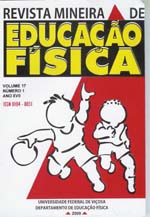TEAM SPORTS ASSESSMENT PRODUCE (TSAP) APPLICATION IN BASKETBALL: LITERATURE REVIEW
Keywords:
performance, basketball, team sports, TSAPAbstract
This review article aimed to analyze the TSAP in the assessment of basketball performance. For this, a survey of all the evaluation instruments used in the period from 1997 to 2015 was carried out. In the review of the studies, we concluded that there is a lack of instruments and research in basketball to evaluate group actions in attack and defense. In this sense, the TSAP presents some limitations in its application, namely on what the player does with the ball in the attack and his lack of specific attention to the movement of the ball. Notwithstanding these limitations, TSAP emerges as an effective tool in order to investigate the influence of traditional and integrative teachinglearning methods, becoming a relevant instrument in the analysis and evaluation of basketball performance.
Downloads
References
GRÉHAIGNE, J. F.; RICHARD, J. F.; GRIFFIN, L. L. Teaching and learning team sports and games. New York: RoutledgeFalmer, 2005.
GRÉHAIGNE, J. F.; MAHUT, B.; FERNANDEZ, A. Qualitative observation tools to analyse soccer. International Journal of Performance Analysis in Sport, v. 1, n.1, p. 52-61, 2001.
GRÉHAIGNE, J. F.; GODBOUT, P. Formative assessment in team sports with a tactical approach. The Journal of Physical Education, Recreation and Dance, v.69, n.1, p. 46-51, 1998.
GRÉHAIGNE, J. F; GODBOUT, P.; BOUTHIER, D. Performance assessment in team sports. Journal of Teaching in Physical Education, v. 16, n. 4, p. 500-516, 1997.
GRÉHAIGNE, J. F.; GODBOUT, P. Tactical knowledge in team sports from a constructivist and cognitivist perspective. Quest, v. 47, p. 490-505, 1995.
GRÉHAIGNE, J. F.; ROCHE, J. Les sports collectifs au bac (Team sports in the baccalauréat). Education Physique et Sport, v. 240, p. 80-83, 1993.
GRIFFIN, L.; BUTLER, J. Teaching games or understanding: theory, research and practice: Champaign, IL: Human Kinetics, 2005.
LIGHT, R.; GEORGAKI, S. Invasion games in physical education: assessing knowledge-in-action in using the Team Sport Assessment Procedure. Authentic Assessment Practices for Student Learning, 2008.
LIGHT, R. An international perspective on Teaching Games for Understanding. Special issue of Physical Education and Sport Pedagogy, v. 10, n. 3, 2005.
LIGHT, R.; FAWNS, R. Knowing the game: integrating speech and action in games through TGfU. Quest, v. 55, p. 161-177, 2003.
NADEAU, L.; GODBOUT, P.; RICHARD, J.F. Assessment of ice hockey performance in real-game conditions. European Journal of Sport Science, v. 8, n. 6, p. 379-388, 2008.
RICHARD, J.F.; GODBOUT, P. Formative assessment as an integral part of the teaching-learning process. Physical and Health Education Journal, v. 66, n. 3, p. 4-10, 2000.
SANTOS, R.; MENDES, R. S. ; DIAS, G.; COELHO E SILVA, M. Avaliação da performance em jogos desportivos: Gpai e Tsap. Revista Conexões, v. 14, n. 2, p.137-157, 2016.
TALLIR, I.; MUSCH, E.; LANNOO. K.; VAN DE VOORDE, J. Validation of video-based instruments for the assessment of GP in handball and soccer. In: INTERNATIONAL CONFERENCE OF TEACHING SPORT AND PHYSICAL EDUCATION FOR UNDERSTANDING, 2., 2003. Resumos… Melbourne, Austrália: University of Melbourne, 2003. p. 108-113,
Downloads
Published
How to Cite
Issue
Section
License
Os artigos submetidos e publicados são de inteira responsabilidade de seus autores, não refletindo necessariamente a opinião do Comitê Editorial. A revista se reserva o direito de efetuar, nos originais, alterações de ordem normativa, ortográfica e gramatical, com vistas a manter o padrão culto da língua, respeitando, porém, o estilo dos autores. O manuscrito submetido deve ser original, não podendo ter sido publicado em qualquer outro veículo de informação científica, e nem submetido para publicação em outra revista científica. Os trabalhos publicados passam a ser propriedade da revista Mineira de Educação Física, ficando sua reimpressão total ou parcial de acordo com a licença Creative Commons Attibution 4.0. Deve ser consignada a fonte de publicação original. Os originais não serão devolvidos aos autores. As opiniões emitidas pelos autores dos artigos são de sua exclusiva responsabilidade.





 Esta obra está licenciada com uma Licença
Esta obra está licenciada com uma Licença 